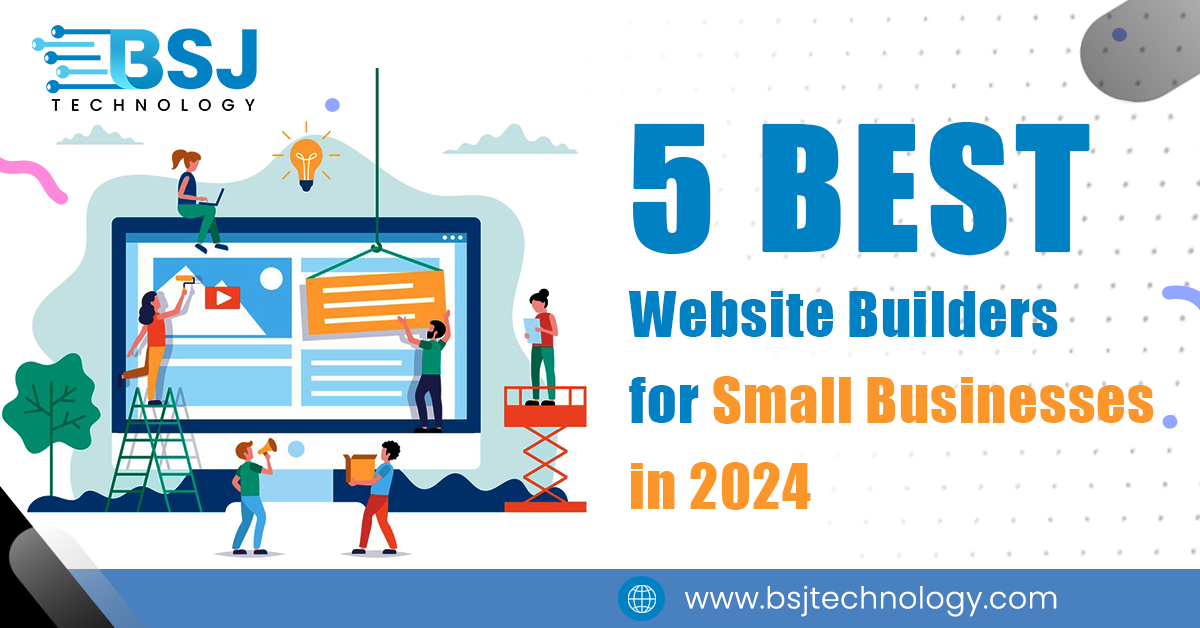5 Best Website Builders for Small Businesses in 2024

Establishing a professional online presence is essential for small businesses. However, with many website builders available, selecting the right one can be daunting. Therefore, this blog will outline the top five website builders for small businesses in 2024, detailing their key features and benefits to guide your decision.
1. Wix
Wix is renowned for its user-friendly interface and extensive customization options, making it an excellent choice for small businesses.
Key Features:
- Drag-and-Drop Editor: Allows users to easily customize their website layout without any coding knowledge.
- Templates: Offers over 500 designer-made templates tailored to various industries.
- App Market: Provides a wide range of apps to add functionalities like contact forms, live chat, and social media integration.
- SEO Tools: Built-in tools to optimize your website for search engines.
Ideal For: Small businesses seeking a highly customizable and easy-to-use website builder.
2. Squarespace
Squarespace is known for its stunning design templates and robust features, perfect for businesses that prioritize aesthetics and functionality.
Key Features:
- Beautiful Templates: Offers a variety of elegant templates designed for different business types.
- E-commerce Capabilities: Integrated tools to set up an online store with ease.
- Blogging Platform: A powerful platform to create and manage a blog.
- Built-in Analytics: Provides detailed analytics and reports to track your website’s performance.
Ideal For: Businesses needing visually appealing websites with powerful e-commerce and blogging capabilities.
3. Shopify
Shopify is a leading e-commerce platform designed specifically for online stores, offering all the tools needed to build, manage, and grow an online business.
Key Features:
- E-commerce Focus: A platform built specifically for selling products online.
- Payment Gateways: Accepts payments through multiple gateways, including Shopify Payments.
- Inventory Management: Simplifies managing inventory, tracking orders, and handling shipping.
- App Store: Extends your store’s functionality with apps from the Shopify App Store.
Ideal For: Small businesses focused primarily on e-commerce needing a comprehensive online store solution.
4. Weebly
Weebly offers a simple and intuitive platform, ideal for small businesses that need a straightforward website builder.
Key Features:
- Easy-to-Use: Drag-and-drop interface for simple website building.
- E-commerce Features: Integrated tools to set up an online store.
- SEO Optimization: Tools to help improve search engine rankings.
- Mobile-Responsive Designs: Ensures your website looks great on all devices.
Ideal For: Small businesses looking for an easy-to-use platform with essential e-commerce capabilities.
5. WordPress.com
WordPress.com combines the power of the WordPress content management system with the ease of a website builder, offering flexibility and scalability.
Key Features:
- Customizable Themes: Hundreds of themes available to create a unique website.
- Plugins: Access to a vast library of plugins to extend functionality.
- Blogging Capabilities: Excellent tools for creating and managing a blog.
- SEO Tools: Built-in tools to optimize your site for search engines.
Ideal For: Businesses that require a highly flexible and scalable website solution with strong blogging capabilities.
Conclusion
Choosing the right website builder depends on your specific needs and business goals. Wix and Squarespace offer excellent design and customization options, while Shopify excels in e-commerce. Weebly provides a straightforward solution for beginners, and WordPress.com offers flexibility and scalability. By understanding the strengths of each platform, you can select the best one to build a professional and effective online presence for your small business. If you have any questions or need further assistance with your website development, feel free to reach out to us.
